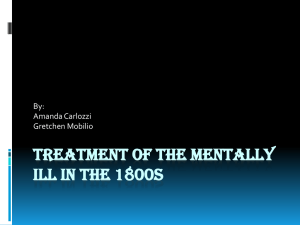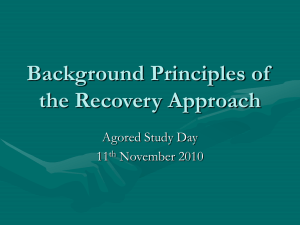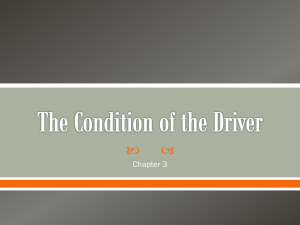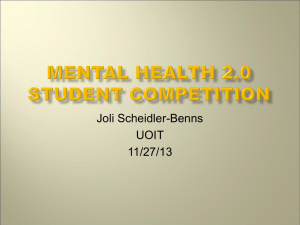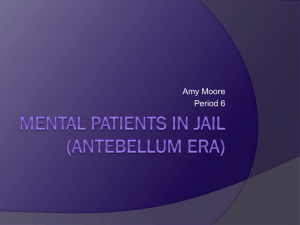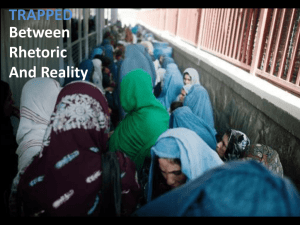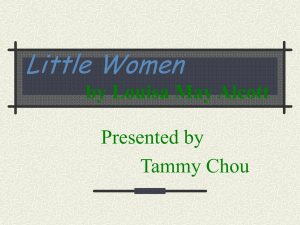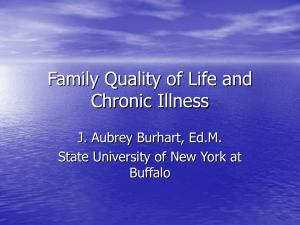BMarimbe
advertisement
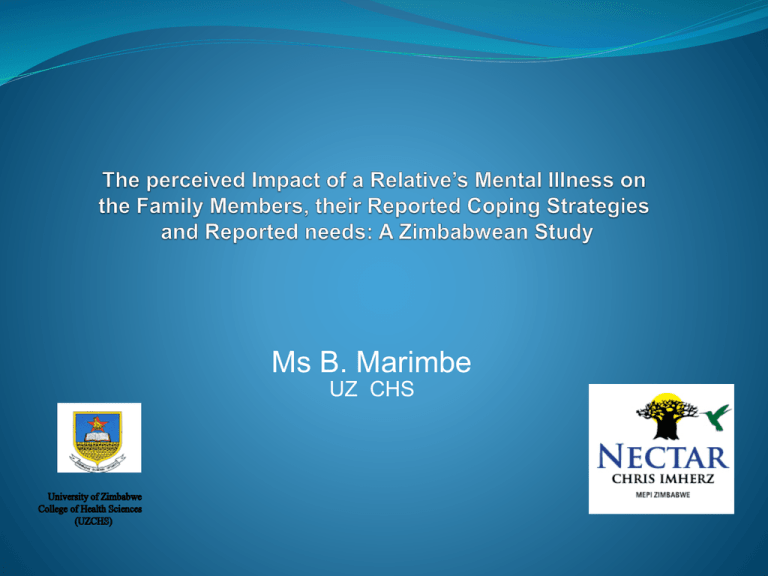
Ms B. Marimbe UZ CHS Study was done in partial fulfilment of a Master of Philosophy in Public Mental Health University: UCT Supervised by : A/Prof Crick Lund (UCT) and Dr F. Cowan( UCL) Sponsor: AFFIRM, NIH Rationale of the study 1.Lack of Support for caregivers Clinical observations have shown that there is very little time given to relatives of the mentally ill patients at Parirenyatwa Annexe Pyschiatry Unit to find out how they are coping with the illness or to give them psychosocial support. This is a concern as the family members are the primary source of care for patients and therefore need to be mentally and physically well to effectively provide care to their mentally challenged relatives. 2. High burden on family members The extent of the burden of mental illness on family members is difficult to assess and quantify and is consequently ignored though it has a significant impact on the family’s quality of life (WHO, 2003). Mental illness in western societies is generally viewed as a family problem rather than a societal problem (Lauber and Rossler, 2007; Yang, 2007; Yip, 2003). There is growing evidence from around the world that families are inadequately supported to provide care required by people with mental illness and struggle to provide this support (Doornbos, 2002; Magliano et al., 2005; Yip, 2003). 3. Lack of Research Currently there are no reliable and valid data on the consequences of mental illness, coping strategies and needs of family members in Zimbabwe Much of the existing research on care giving in families living with mental illness has been conducted with families living in Western societies (Aschbrenner, 2009; Moller et al., 2009; VanDer Voort et al., 2007). Numerous studies in Western countries have shown that family care causes stress, financial difficulties and depression (Wancata et al., 2006). Studies in USA have shown that 43% to 92% of caregivers of people with mental illness report being stigmatized (Struening et.al, 2001). Caregivers of bipolar patients and schizophrenic patients in USA use both problem focused and emotion focused coping strategies (Magliano et al.,1998 p153) Psycho-educational interventions have proved useful in caregivers of schizophrenia and bipolar disorder patients (Kupiers and Bebbington, 1985). Findings from the above studies may not accurately reflect the experiences, coping strategies and needs of families living in Zimbabwean societies and are unlikely to be generalizable in the Zimbabwean context. Aim of the study To explore the perceived impact of mental illness, reported coping strategies and needs of family members of patients with bipolar disorder and schizophrenia attending the Parirenyatwa Annexe Psychiatry unit in Harare Zimbabwe. OBJECTIVES To explore the perceived impact of mental illness on family members when a relative is mentally ill. To explore the strategies used by family members to cope with having a relative who is mentally ill. To identify the reported residual needs among family members with a mentally ill relative. To assess psychological distress among family members with a mentally ill relative, using the 14 Item Shona Symptom Questionnaire (SSQ). Methods An exploratory qualitative study design was used for the study Ethical approval was sought from all the relevant ethical bodies. Informed consent was obtained and participation was voluntary Participants were drawn from family members who accompanied patients either for review, admission or had come to visit their relatives. Setting: Parirenyatwa Annexe Psychiatry Unit in Zimbabwe Consenting family members who were 18 years and above and directly involved in the care of patients with schizophrenia or bipolar affective disorder were included in the study. Family members of patients with other psychiatry conditions and those having a first episode were excluded. A purposive sampling technique was used Family members who accompanied or visited the pts were identified by the psychiatry nurse who knew the patients’ diagnoses. Diagnosis confirmed through pt’s records. The study was explained to the relatives and informed consent obtained and verbal consent from the patients. Sampling was discontinued when no new information was forth- coming from newly sampled participants and a total of 31caregivers participated in the study. Nine in-depth interviews were conducted using an interview guide in the most common local language. Three Focus Group Discussions comprising of 9, 6 and 7 participants respectively were conducted. A self-administered 14-item Shona Symptom Questionnaire (SSQ) was used to assess family members for CMD after the interviews. Data management Interviews were tape recorded and transcribed verbatim . Names or other personal identifiers were removed from transcripts before they were translated from Shona into English. Transcripts were then entered into NVivo 8 (QSR International, Australia), a qualitative data storage and retrieval program to facilitate analysis. SSQ 14 results were captured using Epi info 7- Questionnaires and consent forms locked in a cupboard for safe keeping DATA ANALYSIS Analysis used the framework approach (familiarization, identifying a thematic framework, indexing, charting, mapping and interpretation) SSQ 14 data analysed using Statistical Package for Social Sciences (SPSS) version 16. Results Twenty one(67.7%) were female (64.5%) were married (100%) had formal education from primary level Thirty( 97.8%) belonged to some church religion Relationship of caregiver to Pt. Impact of mental illness Physical Being beaten, physically hurt ‘Yes it has affected us especially my husband he was assaulted and got injured. For me I was once assaulted by him but there is nothing to show but as for my husband he was hurt’ (R4). Body response due to the impact (loss of weight, back pain, high blood pressure (BP)) “I now have high blood pressure because of the illness of my daughter” (R6). Psychological and Emotional Crying fear of the patient Kufungisisa (Thinking too much) “I am thinking too much and I can’t stop thinking like you were given a child by God and you see him grow nicely and all of a sudden the child changes especially when I see his peers I see that my child would be doing this and that but now he can’t its really painful…..”Starts crying (R3). ‘ Financial Impact Spending money on person’s treatment “In terms of finances we have challenges with money for medication, money is a problem but you struggle as a parent but its hard, the father says we should spend even if we don’t have if it is going to benefit the child there is no problem”.(R3). Damage to property Loss of time to generate income/grow own food ‘ Social Impact Stigma “Relatives and outsiders don’t accept that these people are mentally ill. They look down upon them and like in my case, my child is so forgetful so others don’t want to mix with her like at times she can be asked that “Do you know this” and she will say “I don’t know” then they will say “You see she is mad”. (R9) Rejection (by family and society more widely) “ I don’t have anyone that I can confide in. My mother denied me as well as my sister and up to now I don’t talk to them because of this illness. All my relatives told each other that if they see my son they should shut the doors so this is my situation”. (FGDR3). Blame (husband/family members, blaming of women) “ So from the time it started my husband said “This is from your family because in our family we don’t have such things and in our family we have never encountered such things. It’s you who brought it to the family”. At times I cry when I think about this.’ (FGDR2). Coping Strategies Problem focused Seeking spiritual assistance in a manner which is linked to understanding the etiology (witchcraft or evil spirits) hence seek assistance from the following): Traditional healers/prophets “It’s true we looked for help from prophets and ngangas [traditional healers] but it’s her father who did that when he was still alive”. (R2). Church/pastor/priest ”For me I have never gone to a traditional healer, I go to the Roman catholic church and I trust in God who created my child and I have asked the priest to pray for him” (FGR1) Emotion focused Confrontation (due to suspicion that patient is acting out) “I shouted at him twice to say shut up and he says do you want to hit me and I was really fed up with his behaviour and useless talk”.(R2) Resignation I can’t live with him anymore, there is no peace, we can’t speak to each other. I am sorry I can’t live with him anymore, I can’t, and I can’t take it anymore’. (R2). Alcohol use "Yes me I really broke down and because there were three people who were sick at that time and you would wander who would be the next so I ended up drinking alcohol because the situation was very stressful” (FGR3). Reported Needs Financial/material Money for subsistence/food/medication/income generation Food handouts ”Me according to my thinking I think if I can be assisted with food it will be fine because these tablets make them eat too much”. (R3) Support groups ”If they do like the one for AIDS it will be fine. Those people with AIDS support each other so we can also support each other I think but we need to be given money by the Government or other rich people” (R6). Training (for taking care of patients) “I think the challenge that most people have is that we don’t have experience or knowledge in caring for people with psychological problems. It is difficult when we don’t have any training ”(FGD3). Information ” Written information is also helpful there is someone who once gave me a book about this illness and it helped me a lot we will know that if it goes this way we do it this way” (R2). Health care worker support You see all these people who are here, its BPs only, and stresses only, only. When we come with these patients the one who they are concerned about is their patient and not us”. (FGD2). Divine intervention ” It’s difficult to say but I just want God to help him to get better and take his medication so that he can get a job and do something with his own hands”. (R4). Comfort and hope ” We want to be given hope just to say things will be better, things will be fine, Don’t worry too much there are people with such conditions that have gone back to work or some have gone back to work. Hope, hope is important” (R3). A total of 21 (67.7%) were at risk of CMD Three (9.6%) were at risk for suicide Strengths The study presents new knowledge on the views of family members of the mentally ill, their coping strategies and their needs. This area has received very little prior research attention in Zimbabwe and Africa in general. Limitations Results can only be generalised to those relatives attending Parirenyatwa Hospital though they are of relevance to others in Zimbabwe. Participants were purposefully selected and the views expressed may not represent those of all the family members of mentally ill patients in Zimbabwe. Discussion Family members experience psychological, physical, financial and social challenges as well as stigma. Sixty eight percent were at risk for CMD, with 10% suicidal Both emotion focused and problem focused coping strategies were used for both conditions Caregivers needed support from health care professionals and the Government to help them cope with the illness. RECOMMENDATIONS More research is needed to explore the magnitude of caregiver burden in Zimbabwe Psycho education intervention is required to mitigate this burden. Support groups for caregivers Urgent need for Health Worker support ACKNOWLEDGEMENTS A/Prof C. Lund (Centre for Public Mental Health, Department of Psychiatry and Mental Health, University of Cape Town) Dr F. Cowan (Centre for Sexual Health and HIV Research, University College London) Department of Psychiatry, University of Zimbabwe College of Health Sciences AFFIRM , NIH for financial support Patients and caregivers (Parirenyatwa Annexe Psych Unit). Thank You



